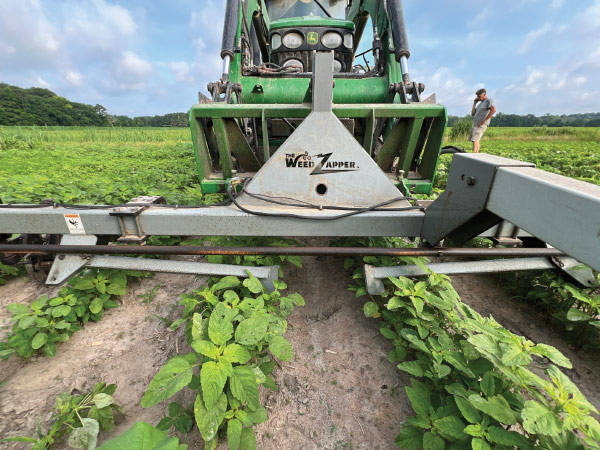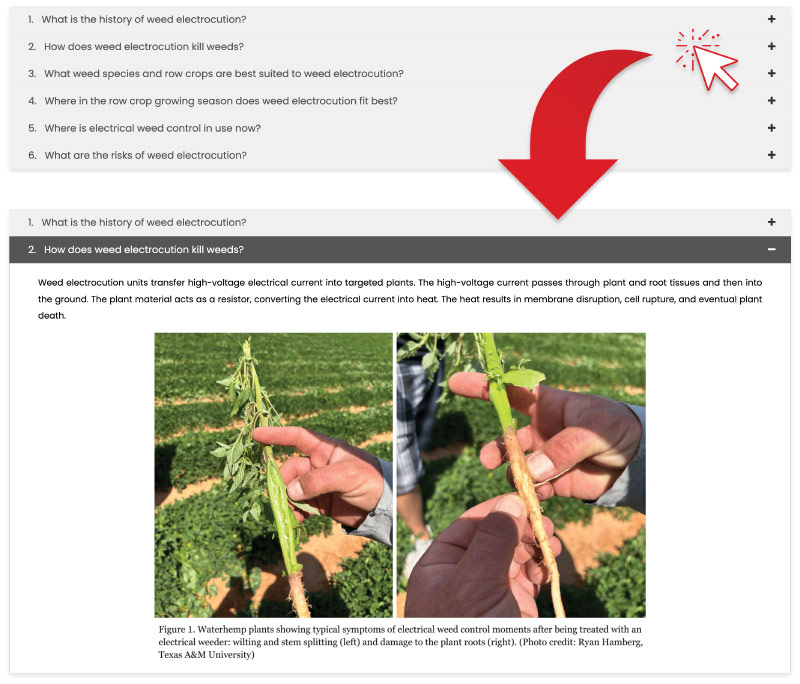Zap On Over to GROW's New Weed Electrocution Page
 |
|
The Weed Zapper at work on a Maryland farm. Photo by Claudio Rubione/GROW. |
By Emily Unglesbee, GROW
There’s a lot happening in the world of electrical weed control, and GROW (Getting Rid of Weeds) wants farmers to have a starting place to learn about it. The group has published a new educational web page on weed electrocution on its website.
The GROW network is a nationwide collaboration between federal and academic weed scientists and a team of communications professionals, who are working to coordinate research and outreach on integrated weed management tactics. The goal is to give farmers—and the industry that serves them—a robust toolbox of weed control options to help them battle the growing epidemic of herbicide-resistant weeds.
As the field of weed management has expanded, so has GROW’s website. In recent years, the organization has developed Extension-vetted, peer-reviewed web pages for its Weed Management Toolbox on cover crops, harvest weed seed control, precision weed management equipment and now, weed electrocution.
The new weed electrocution page was written by Texas A&M graduate student Ryan Hamberg, with contributions from Dr. Muthu Bagavathiannan (Texas A&M), Dr. Marcelo Moretti (Oregon State University), and Luisa Baccin (Oregon State). The page was reviewed by Dr. Lynn Sosnoskie, who has been exploring weed electrocution options for New York growers at Cornell University.
The new page covers six basic questions about the practice of electrical weed control, in easy-to-expand accordions:
 |
|
Easy-to-expand accordion navigation allows users to explore six basic questions about the practice of electrical weed control. |
What is the history of weed electrocution? This short section digs into the brief history of research into electrical weed control and the first commercial methods to emerge.
How does weed electrocution kill weeds? Learn about the two types of electrical weed control tools on the market today, and how they each work to kill weeds via high-voltage currents.
What weed species and row crops are best suited to weed electrocution? Here Hamberg breaks down the growing research from U.S. institutions on how well each electrocution method works in different crop settings and on individual weed species.
Where in the row crop growing season does weed electrocution fit best? Crop height and time of the season are major factors discussed in this section, which also includes a video of a farmer showcasing electrical weed control on his Maryland farm.
Where is electrical weed control in use now? Here, Hamberg lays out current commercially available weed electrocution devices in North America, including the crop industry where they are most commonly found.
What are the risks of weed electrocution? You can’t discuss high-voltage electrocution devices without covering the dangers! In this section, Hamburg runs down the list of hazards, from fires and accidental human electrocution to the effect on nontarget insects and microbial organisms in the soil.
Finally, at the bottom of the page, you’ll find a carousel of GROW’s most recent news page articles featuring weed electrocution, so readers can stay up-to-date with current developments in the industry.
GROW web pages are dynamic and always expanding as new information and research comes along, so bookmark the page, and see how this electrifying industry develops!
In the meantime, interested farmers, crop advisors and Extension agents should put a GROW Farmer Forum on weed electrocution on their calendars for July 23, 11 a.m. ET. The forum will feature a panel of farmers using weed electrocution on their farms in Ohio and Maryland, with guidance from TAMU’s Ryan Hamberg. Register for free at virginiatech.zoom.us/webinar/register/WN_uP-XOdtBSPe5geHz1x3-nQ.
Outstanding Achievements in Integrated Pest Management Award

GROW (Getting Rid of Weeds), College of Agriculture & Natural Resources, University of Delaware, received an Outstanding Achievements in Integrated Pest Management Award from the Northeastern IPM Center in 2025. The annual award, launched in 2019, recognizes individuals or organizations whose work on IPM in the Northeast deserves special recognition.
More details can be found at neipmc.org/go/ApbM.
